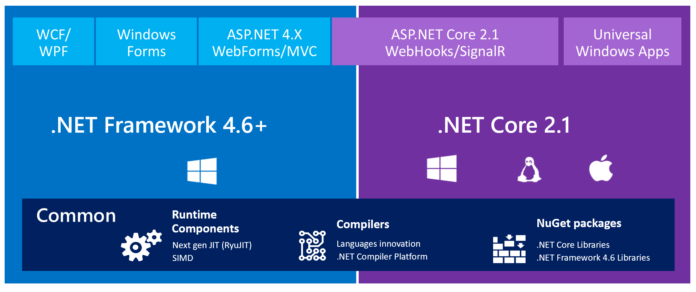
Web services have become the backbone for major organizations across the globe today. With the power of the internet reaching out to everyone, it can definitely be said that it has undoubtedly opened newer doors in the form of opportunities for people. Amidst the technical advancements made in the past decade, the .NET framework has made a name for itself. The reliability, coupled with modularity and ease of access, has made this an excellent option for developers. Today, platforms, such as ASP.NET and ASP.NET Core, are widely used for one thing or another.
Understanding the basics: ASP.NET and ASP.NET Core

To start off with, the ASP.NET, as mentioned above, is a part of the .NET framework by Microsoft. It is used for the creation of various websites and other web-based services and applications. The ASP.NET actually works on Hypertext Transfer Protocol or HTTP; in fact, it also uses the commands used in HTTP for the most part.
It has to be noted that ASP.NET is the culmination of various languages such as HTML, JavaScript, and CSS. This gives it a broader range of services to work with. Since its deployment in 2002, ASP.NET has seen various updates through the years; as of now, the version being used everywhere is 4.6. The ASP.NET has delivered excellent performance over the years since its inception. People have actually developed a plethora of services online. The current trend of startups has helped businesses grow beyond recognition. The digital realm has helped a lot of people over the past few years, which is really a thing to behold.
The ASP.NET has been a great platform for people who possess a dedicated approach towards handling a particular set of clients for a limited window. Websites have been made before and are still being made to this day using this platform. Over the years, the ASP.NET has seen a number of additions and changes that have resulted in it becoming a preferred option by many. Back in 2005, the improvements made in the framework class library resulted in a smoother workflow.
The following years afterward saw numerous additions and changes that made the platform worth people’s attention. The addition of WPF, WCF, and WF in 2006 gave the platform a much-needed boost in performance and popularity. Similarly, further additions in 2007, 2010, and 2012 brought LINQ, Parallel LINQ, .NET APIs, etc. to the table, making the platform all the more suitable for users across the globe.
Now, as far as the ASP.NET Core framework is concerned, well, it is an upgraded version of the ASP.NET framework, which has been discussed earlier. Although it was released as ASP.NET 5, later down the line, it became ASP.NET Core.

The best thing about the ASP.NET Core framework is the fact that it is open-source, which means it is free for all. Plus, the cross-platforming capability allows for more and more people to use the framework and get creative with their ideas. As of 2018, the latest version of ASP.NET Core being used is version 2.1, the very first one was released way back in 2016 as version 1.0. One can also know more about it by visiting bright.io, to begin with.
Apart from the notable features that come equipped with the ASP.NET Core, the platform also runs on .NET Core and .NET Framework, which makes it all the more suitable for frequent creation of websites and other applications. Cross platforming offered by the ASP.NET Core allows people to utilize the same resources over several platforms across the globe; this provides the users with ample opportunities to expand their businesses.
Furthermore, ASP.NET Core is a cloud-ready environment that keeps tabs of all the things that need to be saved. The configuration has been made easier with the inculcation of the cloud-ready environment as well. It can be hosted on multiple platforms as well, namely IIS, Nginx, Apache, HTTP.sys, etc., this gives further options to people who wish to address things on platforms of their choosing.
The ASP.NET Core really provides people with so many possibilities as compared to ASP.NET that it has become a more viable solution to the currently existing problems. Things like cross-platform capabilities, accessibility, open-source software options, etc. have become the basic norm for a successful model today.
Significant differences between the two frameworks

While the latter one among the two is the upgraded version of the former, there are a few significant differences that will clear the doubts of readers regarding their queries. With the growing number of websites in today’s digital realm, it is safe to say that the .NET framework has served many developers over the years. Businesses have increased with the addition of newer types and their subsequent updates. These significant differences between ASP.NET and ASP.NET Core have been mentioned below.

- The ASP.NET framework is restricted to the Microsoft platform only, being a version of the .NET framework, it surely is useful, but it fails to cater to the needs of other OS users.
- The ASP.NET Core, on the other hand, serves all kinds of OS users across the globe, be it Windows, Mac, or even Linux.
- The ASP.NET has a good performance, but the ASP.NET Core has even better performance when compared to the latest version of ASP.NET.
- The ASP.NET supports C#, VB, and many other languages, however, the ASP.NET Core supports only C# and F# as major languages.
- One needs to recompile the code after changes to make it work in ASP.NET; however, one doesn’t need to do the same in ASP.NET Core.
- Nearly all major versions support ASP.NET while one needs an updated Visual Studio for ASP.NET Core. This tells the difference between complexities present in both platforms.
- The container support for ASP.NET is not as good as that of ASP.NET Core. ASP.NET Core is well suited for deployment in Docker.







